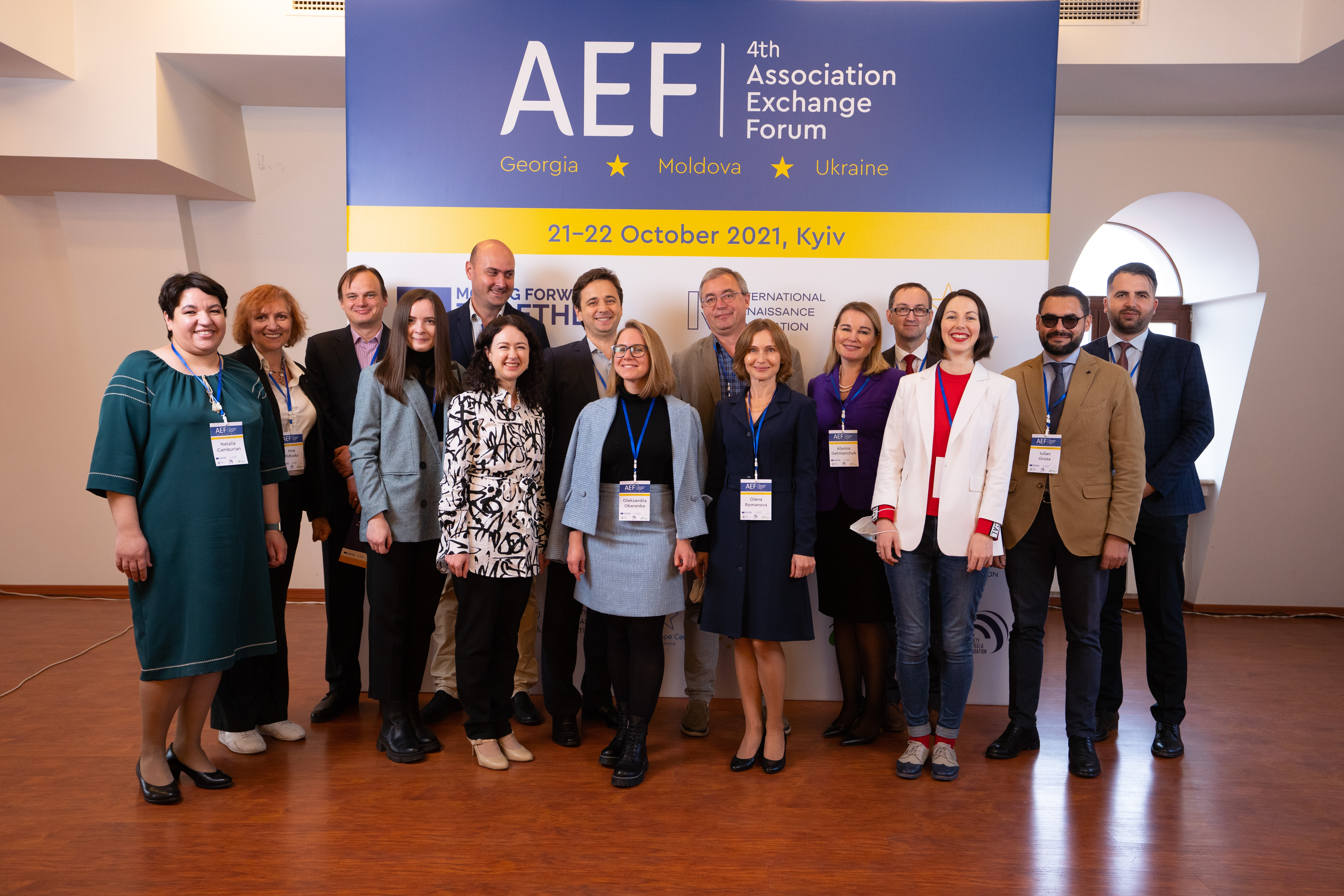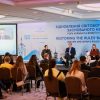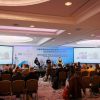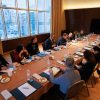Last week ended up with the 4th Association Exchange Forum (21-22 of October) – the two-day offline event was devoted to exchange of ideas on Association Agreements (AAs) implementation in three states: Ukraine, Moldova and Georgia.
The 4th edition of AEF took place in a broader context of policy thinking in various European capitals on the future of the EU, post-Brexit, EU enlargement in the Balkans and a further development of the European single market, and – last but by far not the least – the new political context in all the three partner countries and in the EU itself.
Namely, the discussion panels were devoted to the following issues:
- Association Agreement in 2021: Where are we now?
- Parliamentary cooperation in implementing the EU integration agenda
- DCFTAs: still fit for purpose?
- Partial EU integration: how Trio countries could use the existing models? The cases of Turkey, Norway, the Balkans and Switzerland
- The external spoilers of EU integration: how Russia and China undermine EU integration
- Trio Strategy: what the three countries could achieve together?
PARTICIPANTS: The Forum participants included:
- high governmental officials from Georgia, Moldova and Ukraine responsible for coordinating the implementation of the Association Agreements between the EU and the three countries,
- leading experts and civil society activists with an expertise on Association Agreements implementation — both from the region and the EU, Brussels and member states, and other European non-members,
- members of European and national parliaments, EEAS and European Commission officials, EU Delegations in Kyiv, Tbilisi and Chisinau, relevant EU technical assistance projects, donor organisations, think tanks and academic institutions.
The Forum was organized by the International Renaissance Foundation and Kyiv based New Europe Center within the EU-funded EU4USociety project, in partnership with the Institute for European Policies and Reform (Chișinău), the EU integration program of the Open Society Georgia Foundation and co-funded by Soros Foundation Moldova.
Video recording of the Forum (Day 1 and 2) is available here: https://bit.ly/4AEF_day1
Photos of the event (Day 1 and 2) are available here: https://bit.ly/3nsyLPj
In line with the forum the Leo Litra (New Europe Center, Ukraine), Iulian Groza (IPRE, Moldova) and Vano Chkhikvadze (Open Society Georgia Foundation) prepared the paper “Implementation of Association Agreements (AAs) in Georgia, Moldova and Ukraine: a comparative overview 2021”, available here: https://bit.ly/2Zg9X55
FULL AGENDA of the event: https://bit.ly/3DZTAIu
Below you will find the highlights from the event and the most striking ideas by the speakers.
DAY 1 (OCTOBER 21)
Introductory remarks
- Oleksandr Sushko, Executive director of the International Renaissance Foundation, Ukraine: “This international project, which was born 4 years ago, is truly international, uniting Ukraine, Georgia and Moldova.”
- Alyona Getmanchuk, Director of the New Europe Center, Ukraine: “I would like to congratulate all of us with the great news: Associated Trio became a reality which is impossible to ignore. Let’s make it such a reality that would be impossible to deny the truly European character of Trio”
Welcoming speech by Dmytro Kuleba, Minister of Foreign Affairs of Ukraine
- We need to get away from “too big”, “too early”, “too difficult” narratives. The European perspective should be on our joint “to do” list. What if the founding fathers of the EU said, “Ah, nay. Let’s not risk”? What if Robert Schuman said, “No, I think we’re not ready yet?”
The full speech of the Minister of Foreign Affairs can be found here: https://bit.ly/2ZgqjKU
Plenary session
- Matti Maasikas, Head of the Delegation of the European Union to Ukraine: “Ukraine`s geographical location doesn’t change, but Ukraine`s geopolitical location is changing every day since the Revolution of Dignity. You finally made your clear choice from east to west. And this is the biggest geopolitical shift in Europe in our times.”
- Natalia Forsiuk, Director General of the Government Office for Coordination of European and Euro-Atlantic Integration: “We really believe that the dialogue with the EU should not only be bilateral, but also with our partners from the Associated trio.”
- Teimuraz Janjalia, Deputy Minister of Foreign Affairs of Georgia: “Despite challenges, we continue our path of EU integration. We have two major goals: 1) Georgia must concentrate on the reform process. 2) The EU must recognize our reform process and make guarantees it will lead to membership.”
- Andrei Popov, Head of Directorate on multilateral cooperation, Ministry of Foreign Affairs and European Integration of Moldova: “Association TRIO provides not only the valuable voice, but also a valuable platform for exchange of experience and opportunity of learning from each other.”
- Moderator: Sergiy Sydorenko, Editor-in-chief of the European Pravda, Ukraine
Conversation with Olga Stefanishyna, Deputy Prime Minister for European and Euro-Atlantic Integration of Ukraine
- “We are not a partner to which the EU only gives support, we are the equal partner. The dialogue at the Summit was a very political one, not the technical dialogue.”
- Moderator: Dmytro Shulga, European Programme Initiative Director of the International Renaissance Foundation, Ukraine
Session 1: Parliamentary cooperation in implementing the EU integration agenda
- Maka Botchorishvili, Chair of the EU integration Committee, Co-Chair of the Euronest Parliamentary Assembly of the Parliament of Georgia: “Here I will highlight two main pillars of the EU integration agenda. We need progress in implementing the Association Agreement. Secondly, political dialogue with the European Union is very important.”
- Adrian Balutel, Member of the EU integration Committee of the Parliament of the Republic of Moldova: “Our association agendas are different and it’s normal, as our internal agendas are very different. But the TRIO is not about the pace, it is about our common direction and ambition for the EU membership.”
- Solomiia Bobrovska, Member of Parliament of Ukraine, Secretary of Committee on Foreign Affairs, Deputy Head of the Ukrainian Delegation in NATO: “That’s a good sign that we finally work with colleagues from Georgia and Moldova as a trio, and I wish we overcome challenges together.”
- Moderator: Hanna Hopko, Chairwoman of ANTS, former Chair of the Committee for Foreign Affairs of the Parliament of Ukraine
Session 2: Association Agreement in 2021: Where are we now?
- Iulian Groza, Executive director of the Institute for European Policies and Reforms, the Republic of Moldova: “We have done much better where we had more concrete benchmarks and legislative frameworks. And we have been less effective in areas that involve more general principles. After seven years I think Moldova is doing quite well in this process, the dynamics is positive.”
- Vano Chkhikvadze, EU Integration Program Manager at Open Society Foundation Georgia: “The progress in Georgia has been uneven. There are fields where we see tangible progress, but there are also fields where we don’t see much progress at all.”
- Oleksandra Bulana, Research Fellow of the Ukrainian Center for European Policy: “According to our research we see that the level of implementation of Ukraine`s commitments under the Association Agreement is 49%. And it’s 7% more than a year ago.”
- Daniel Szeligowski, Head of Eastern Europe Programme at the Polish Institute of International Affairs (PISM): “Many EU countries are against closer ties with EaP. Some diplomats say we can only talk on sector cooperation, not sector integration. It can be considered political fiction. From their point of view, lack of progress is positive – they can maintain the status quo.”
- Nicholas Cendrowicz, Deputy Head of the Georgia and Moldova Unit, European Commission: “A lot of easy things have already been done, now we deal with complicated issues that take a lot of time. Don’t do it fast, do it right. Stability of commitment is important, not speed.”
- Moderator: Olena Pavlenko, President of DiXi Group, co-chair of the EU-Ukraine Civil Society Platform
DAY 2 (OCTOBER 22)
Session 3: DCFTAs: still fit for purpose?
- Veronika Movchan, Academic Director at Institute for Economic Research and Policy Consulting, Ukraine: “DCFTA is not only about technical issues, it’s also about the political ones. The final purpose of it is to improve the welfare of citizens.”
- Tinatin Akhvlediani, Researcher at the Center for European Policy Studies (CEPS), Georgia: “DCFTA fits the purpose, but it is all about its proper implementation, and there are areas, which need to be revised and updated. There are many reservations form EU side, not the Georgia sid.”
- Denis Cenusa, ”Energy Security” Program Director at Expert-Grup, Moldova: “Trio integration is not only for Kyiv, Chișinău and Tbilisi, the local authorities should be involved. The DCFTA is not only about the opening of EU markets, but also to help the European integration of the country.”
- Michael Emerson, Associate Senior Research Fellow at the Center for European Policy Studies (CEPS), Brussels: “Trade laws and key regulatory policies are long term affairs. Regulation encourages change. After seven years, we are now in need for fresh political momentum.”
- Moderator: Kateryna Wolczuk, Associate Fellow at Chatham House’s Russia and Eurasia Program
Session 4: Partial EU integration: how Trio countries could use the existing models? The cases of Turkey, Norway, the Balkans and Switzerland
- Evgheniya Gaber, Foreign Policy Advisor to the Prime Minister of Ukraine: “The strategic partnership with the EU without being the member of the EU might be an option for Turkey’s partial integration. This is something the most viable, because the most flexible.”
- Kateryna Shynkaruk, Senior Lecturer at National University Kyiv Mohyla Academy, Chair of International Relations, Ukraine: “In Swiss bilateral agreements there was a component of funding of the EU enlargement. Swiss contributed into societal and economic adjustments to enlargement.”
- Daria Gaidai, Foreign Policy Advisor to the Deputy Prime Minister of Ukraine for European and Euro-Atlantic Integration, Ukraine: “Everything that’s going on in the Balkans directly impacts our relations with EU, our negotiations and our future perspective.”
- Moderator: Szymon Ananicz, Stefan Batory Foundation, Poland
Session 5: The external spoilers of EU integration: how Russia and China undermine EU integration
- Sergiy Solodkyy, First Deputy Director of the New Europe Center, Ukraine: “Does Ukrainian government understand properly the risks that may pose those investments of China? My observations show that not all Ukrainian decision-makers understand these risks.”
- Paata Gaprindashvili, Director of Georgia’s Reforms Associates (GRASS), Georgia: “The main objective of Russia is to bring Moldova, Georgia and Ukraine back to its sphere of influence.”
- Iulian Chifu, President of the Conflict Prevention and Early Warning Center, Romania: “Russia is more inclined for immediate turbulence and the creation of instability, China on the contrary, is more inclined to stability and patience in the region for business purposes.”
- Stefan Meister, Head of Program “International Order and Democracy” at DGAP, Germany: “Both China and Russia have different strategies and partly different interests. Both try to undermine democratic efforts, and try to promote business ones.”
- Moderator: Leo Litra, Senior Research Fellow of New Europe Center, Ukraine
Closing Session: Trio Strategy: what the three countries could achieve together?
- Ihor Zhovkva, Deputy Head of the Office of the President of Ukraine, Diplomatic Advisor to the President: “We need more Europe for this part of the European continent. If it becomes less here, we’ll not only have Russian aggression, we’ll have the ongoing process of Russian aggression spreading across Europe.”
- Cristina Gherasimov, Foreign Policy Advisor to the President of the Republic of Moldova: “The trio strategy is more of a coordination mechanism of messages we want to send to Brussels. We can do much more than that. We can find joint solutions to common problems and approach common problems in new ways.”
- Pierre-Alexandre Crevaux, Specialist, Communications Division, Administration of the President of Georgia: “The beauty of the three countries coming together, is that this wasn’t a case of Brussels telling us what we can do, it was us coming together to say we have an idea.”
- Moderator: Iulian Groza, Executive director of the Institute for European Policies and Reforms, the Republic of Moldova
















































